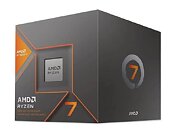- Joined
- Oct 9, 2007
- Messages
- 47,670 (7.43/day)
- Location
- Dublin, Ireland
| System Name | RBMK-1000 |
|---|---|
| Processor | AMD Ryzen 7 5700G |
| Motherboard | Gigabyte B550 AORUS Elite V2 |
| Cooling | DeepCool Gammax L240 V2 |
| Memory | 2x 16GB DDR4-3200 |
| Video Card(s) | Galax RTX 4070 Ti EX |
| Storage | Samsung 990 1TB |
| Display(s) | BenQ 1440p 60 Hz 27-inch |
| Case | Corsair Carbide 100R |
| Audio Device(s) | ASUS SupremeFX S1220A |
| Power Supply | Cooler Master MWE Gold 650W |
| Mouse | ASUS ROG Strix Impact |
| Keyboard | Gamdias Hermes E2 |
| Software | Windows 11 Pro |
AMD's newly announced Ryzen 8000G "Hawk Point" desktop APUs do not support ECC memory, contrary to what the specifications on the AMD website had initially shown, Reddit users found out. The company has since quietly edited its product pages to remove the bit about ECC support. For the overwhelming majority of desktop client use cases, including enthusiast PCs, ECC memory support is irrelevant. That said, the memory controllers of "Phoenix" in Ryzen PRO 7000 mobile processors for commercial notebooks support ECC memory, and so it stands to reason that upcoming Ryzen PRO models for both commercial desktops and notebooks might feature it.
The AMD Ryzen 7 8700G and Ryzen 5 8600G are based on the 4 nm "Hawk Point" monolithic silicon, with a more overclocker-friendly set of DDR5 memory controllers than the ones found in the Ryzen 7000 "Raphael" processors. Besides support for several high-frequency DDR5 modes, the memory controller technically supports ECC (at least "Phoenix" does, on the Ryzen PRO 7000 mobile processors). The memory controller also supports a maximum of 256 GB of memory, or 64 GB dual-rank memory modules per slot. It also supports 24 GB and 48 GB DIMM densities.

View at TechPowerUp Main Site | Source
The AMD Ryzen 7 8700G and Ryzen 5 8600G are based on the 4 nm "Hawk Point" monolithic silicon, with a more overclocker-friendly set of DDR5 memory controllers than the ones found in the Ryzen 7000 "Raphael" processors. Besides support for several high-frequency DDR5 modes, the memory controller technically supports ECC (at least "Phoenix" does, on the Ryzen PRO 7000 mobile processors). The memory controller also supports a maximum of 256 GB of memory, or 64 GB dual-rank memory modules per slot. It also supports 24 GB and 48 GB DIMM densities.

View at TechPowerUp Main Site | Source





